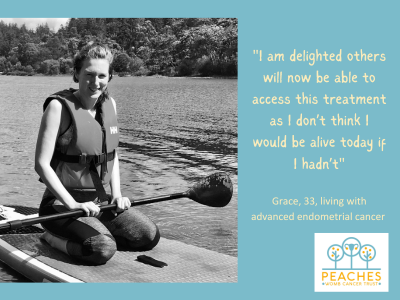Each year, approximately 9,700 people in the UK are diagnosed with womb cancer, most of which are endometrial cancer. Around 1,400 people are diagnosed with advanced cancer, and cancer recurs (grows back) in around 1,100 people. A quarter of those diagnosed with womb cancer will die of their cancer.
Until today, there has been no standard second line treatment available to everyone with advanced or recurrent endometrial cancer. This means that people with advanced or recurrent endometrial cancer have limited options if chemotherapy isn’t effective.
People with advanced or recurrent endometrial cancer have been waiting a very long time for a treatment that would help them to live well for longer. We know from all the enquiries we receive how frustrated they are by the lack of effective treatment options and how desperately a new treatment is needed.
Peaches Womb Cancer Trust is therefore thrilled that, as of today, everyone diagnosed with advanced or recurrent endometrial cancer in England can access a new treatment that has been approved by The National Institute for Health and Care Excellence (NICE).
Approval of pembrolizumab (Keytruda), a type of cancer treatment called immunotherapy, and lenvatinib (Lenvima), a cancer growth blocker, will offer the potential for people with womb cancer to live longer, to feel well, and to live more independently, and with improved quality of life.
We expect that around 750 people in England stand to benefit each year from this new treatment.
Professor Emma Crosbie, Chair of Trustees of Peaches Womb Cancer Trust, said:
“This innovative new treatment regimen will benefit patients with advanced or recurrent endometrial cancer, who currently have very few effective anti-cancer treatments available to them.
“Every year, many people are facing a diagnosis of advanced or recurrent womb cancer, and the frightening reality of very few treatment options that can improve their survival and quality of life.
“Those affected by womb cancer deserve more treatment options, but we hope that this is just the first step towards wider availability of more effective treatment options for those affected by this devastating cancer. We desperately need more research to help us find new ways of preventing, diagnosing, and treating endometrial cancer.”
Grace Teeling, 33, living with advanced endometrial cancer, said:
“I have been incredibly fortunate to receive this treatment for the past two years. I have had a really good response to the treatment which means there is currently no evidence of cancer on my recent scans.
“It has also enabled me to thrive despite having an advanced and incurable cancer diagnosis. I am able to work, travel, socialise and exercise, including paddleboarding, which I may not have been able to do on chemotherapy.
“I am delighted others will now be able to access this treatment as I don’t think I would be alive today if I hadn’t.”
Peaches Womb Cancer Trust supported the NICE appraisal. It could not have done this without the contributions of Peaches Patient Voices, a group of people who have been affected by womb cancer, and members of the Womb Cancer Support UK community, whose powerful testimonies and experiences informed our submissions to the appraisal process.
To find out more about the work of Peaches Womb Cancer Trust, please visit our our social media channels.


